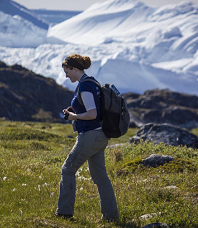News
Tuesday, September 8, 2015

Imagine cruising through the Arctic in a zodiac, getting up close with some of the world’s oldest icebergs and having the opportunity to taste narwhal. Those are just some of the recent adventures that second year Marine Environmental Technology student Katie Morrissey describes from her recent Arctic Expedition with Students on Ice.
“Ending my second year of the Marine Environmental Technology program at the Fisheries and Marine Institute of Memorial University, I have never been so enthusiastic about my education and being able to participate in the Students on Ice Arctic expedition was absolutely a perfect fit for me,” said Miss Morrissey.
Katie spent almost two weeks sailing around the Arctic in late July and early August. Her most memorable experience was a visit to Ilullissat, Greenland, a UNESCO World Heritage Site, where she describes icebergs and tightly packed ice throughout the fjord heading towards the open ocean.
“The sight instantly (and literally) took my breath away and brought tears to my eyes,” she said. “It was amazing to see 250,000 year old ice moving as quickly as 9m per day into the open ocean towards the shores of my home province Newfoundland and Labrador.”
Katie feels fortunate to have had the opportunity to see this particular part of our planet not only for its sheer beauty but also for the perspective it has given her on icebergs.
“Each Spring I see these gigantic chunks of ice float by the coast of Newfoundland,” she said. “I always knew that that they were pieces of something much larger; however, after seeing the Ilullissat Icefjord and getting somewhat of a grasp on the scale of how quickly this part of our planet is warming up and disappearing, icebergs are something much more to me now.”
Katie also came to quickly realize how little she knew about Northern Canada and the issues facing the area. Her experience allowed her to become more informed and solidifies her views on voting –something she feels is important for all youth. “Voting is an opportunity for each and every one of us to have our say in what is important in this country and being informed is key,” she said.
Katie’s understanding of global warming and the impact of our carbon footprint was also broadened during the expedition. “Bringing cloth bags to the grocery store and recycling plastics and papers help us do our part in the reduction of waste, energy, general pollution, and thus our carbon footprint,” she said. “However, after visiting a very small portion of the Arctic, meeting some of the wonderful people that live there, learning some of their traditions and some long, hard thinking, I have realized I’m not really sacrificing anything while doing my part to save the planet.”
For Katie, the real sacrifice is being made at the poles of our planet. While we (sometimes) forego the use of plastic bags, the polar regions of our planet are seeing less access to hunting grounds via sea ice as each year goes by.
“Mid-latitude regions are headed in a more positively impactful direction when youth and education are taken into consideration, but I believe that we all need to sacrifice a little more than our plastic water bottles in order to make a noticeable difference and show the people and the earth in the polar regions that we do care,” she continued.
Katie is thoroughly enjoying her program at MI and thanks to her Students on Ice experience, has broadened her plans for the future. So many unexpected subjects peaked her interest while on the expedition, including natural education, exploring, sailing, mammals, politics, and hunting.
“I haven’t quite figured out how to crochet all of those together yet, but I’m thinking I’d maybe like to be a Captain Astronaut Marine Environmental Exploring Educator who dabbles in environmental awareness events, and hunts for her own food. That’s a thing, right?” she laughs.
For Katie, her education had been solidified. “I always knew that in whatever I did, I wanted to help improve the Earth’s condition rather than worsen it,” she notes. “However after spending a week with Students on Ice – exploring, experimenting, trying new foods and getting to know people from all over the world, I am certain that while that is still the basis of my long term plan, I am now considering how I can incorporate the Arctic in that vision.”





